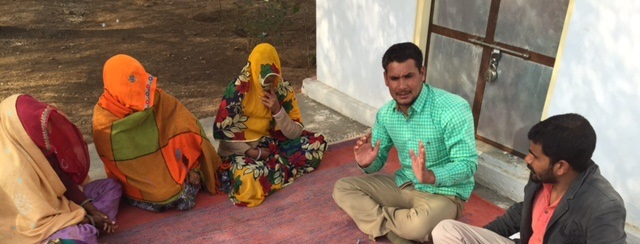
What makes for ‘Successful Implementation’?
27 October 2016
If you asked the Government administrative machinery its point of view, they would likely report that the key to successful implementation is the flow of messages through the cascade, exactly as per plan. By that measure, Accountability Initiative (AI) has been extremely successful in its work with the managerial staff responsible for effective School Management Committees (SMC)[1] in Rajasthan. The State Project Director issued an order, which was reissued in some detail to the Directorate and Sarva Shiksha Abhiyan offices in the Bassi district. Following this, the District Education Officer put his Resource Persons (RP) in charge of implementation.
The RP in-charge of community mobilisation and the RP in-charge of monitoring took care to demonstrate their interest. They reached out immediately to the head teachers of the schools concerned through WhatsApp and phone calls to relay the message of our imminent arrival. In turn, the principals used every power vested in them to ensure warm and welcoming SMC meetings as per schedule – complete with tea and alu bhujia served to every SMC member they were able to track down the morning of the meeting. Technically speaking, access was granted. And, like many before us, and many who will follow, we bustled about our business busily, convinced of our clarity and of our purpose.
While AI was ticking off rapport building on its list of to-dos, the RPs used their well-healed experience to clear just enough time in their schedules to estimate the possible consequences of AI presence in their geography – a calculation based on the amount of influence they perceived we had, and the iron-grip they have over status quo. In other words, right there, in the first meeting, this cadre, held in place by a political warren connecting the cluster to the State, made a reliable prediction about the impact of our work.
What we learnt in the year to follow and what the RPs knew at the time, was that the effectiveness of an SMC as an accountability mechanism depends entirely on how it is constituted. Their elections are doctored to reflect the corrupted norms that rule local self-government. The transactional relationships between a highly politicised teaching community scattered carefully across clusters, with corresponding interests at the block and district level, collectively control the fate of reform implementation.
This elaborate, unmentionable, unrelenting web confines reform such that it does not significantly disturb the stakes. Head teachers implement picture-perfect election days attended by all the parents, and then some ‘respected’ elders of the community and announce a list of SMC executive committee members. Except that, parents come from families with children who have stayed in school. Protected by the rule that Rajasthan allows schools to keep students on their rolls without needing them to attend regularly (once in a three-week period is considered adequate), the most vulnerable families quickly drop out of local, education-related decision-making. And the list that the head teachers present to this rarefied group, is pre-approved by the political network in tandem with the block level administrators.
While clinical, densely invested pilots gasp for life as they face the mammoth immovable machinery that blocks innovation from crawling up to state policy or trickling down from elevated echelons, implementation is very often successful. Success is defined at the block level by the studied facade of meek, disenfranchised, seemingly cooperative officers, whose charge it is to maintain the machine’s power structures. By definition, it means that there is no lasting change.
Read my next blog about the role of school leaders in ‘successful implementation’.
[1] Accountability Initiative has been been working in the Bassi block in Rajasthan, to ascertain the challenges to the education management as it takes on the task of running effective SMCs. Of the many levels of education bureaucracy we work with, there are 6 principals of schools who are provided inputs on coaching SMCs on fiscal literacy.





